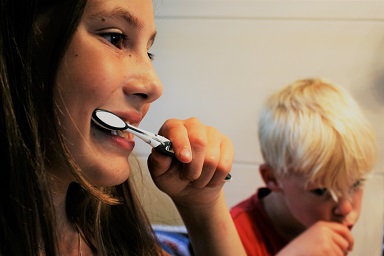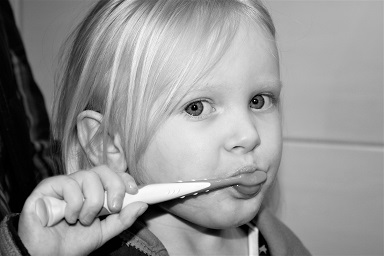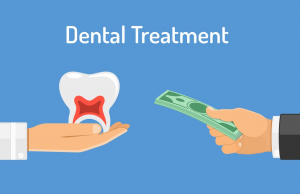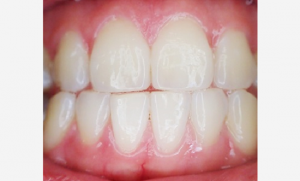Optimal dental care for children
Many parents know it well and spend many evenings in uneasy anticipation of a certain dental care-related "ritual". Of course, we are referring to brushing their children's teeth, given that the little ones usually have zero interest in dental care and have absolutely no tolerance for having their parents stick a toothbrush in their faces. Though such "family theater" is without a doubt a part of growing up, parents need to stay firm in their position because any easing up will end up having negative consequences on the dental care of their children in the longer run.Index
- Pediatric dental care done right - Our recommendations and suggestions
- Dental care for children up to the age of 5
- Dental care for children between the ages of 5 and 8
- When can parents leave dental care up to their children?
Once the first milk teeth (baby teeth) come through the gum line roughly 6 months after a baby's birth, it is of crucial importance for parents to start brushing their children's teeth right away. Even when this task can become a de-facto battle, sticking through it is essential, because children absorb many different kinds of sugars even at a very young age that can lead to tooth decay not only for the temporary but, in the longer run, also for the permanent teeth, once they emerge.
Parents shouldn't, however, worry too much because experts have put together a list of proven tips for a successful and almost pleasant dental care experience. From the get-go, it is really important to remember that, irrespective of which approach to pediatric dental care parents decide to use, they should do so with care to not create long-lasting negative associations with dental care for their children.

Don't forget – brush your teeth at least twice a day!
Pediatric dental care done right – Our recommendations and suggestions
The first step towards ensuring excellent dental health for a child is to set up regular check up visits with a pediatric dentist, which you can nowadays easily book online via DentalAce. Also, you should plan for a dentist visit at least once every 6 months so that any signs of decay or other conditions can be identified and addressed early on. This will also establish a longer-term habit for the child to regularly see a dentist without worrying too much about it.Needless to say, brushing teeth at least twice a day is indispensable and a child should get used to brushing after breakfast and before going to bed. Here are some more helpful tips to remember and put to good use:
- Be a good role model: To make sure that children take their dental care seriously, their parents need to be good role models for them and show just how important dental care really is by taking it seriously themselves. Only by doing so will children learn that brushing their teeth twice a day is not optional but a must.
- Explain, don't force: Using force to make a child do something is an option that parents can resort to, but it can lead to negative consequences. The better approach is to calmly explain the importance of a task to a child via personal stories, examples from the past, and other engaging ways of communication.
- Use the same toothbrush: With this, we do not mean that parents and children should literally use the same toothbrush but, rather, that they should all use the same toothbrush type. For example, if parents use bamboo toothbrushes, then their children should also get the same ones to not make them feel treated differently.
- "Ritualize" dental care: If explanations and demonstrations do not suffice to motivate a child to take dental care seriously, parents may resort to yet another approach: turning the daily dental care routine into a ritual. For example, proper dental care can be tied to rewards like goodnight stories or playground visits to encourage children to take it seriously.
- Eat healthy: This recommendation is useful for a person's general health and also prevents the formation of plaque. Fresh legumes, fruits, and more water instead of juices and sugary foods form a strong nutritional foundation that will serve children well later in their lives.
Should a child fall asleep after a long day before brushing from time to time, parents can resort to Xylitol mouth wash as an effective and easy way to rinse out the child's mouth and prevent tooth decay for the night. As an added benefit, Xylitol has a sweet taste that children may like.

Learn proper dental care as early as possible!
Dental care for children up to the age of 5
The most important goal of pediatric dental care is simple: Keep the milk teeth healthy!This is especially important because, as already mentioned, decaying milk teeth can pass said decay on to permanent teeth that grow underneath them. And since a child does not get another "do-over" once the permanent teeth emerge, parents should make it a priority to prevent any damage to milk teeth that may be transferable. Therefore, brushing teeth twice per day – ideally with a fluoride-containing toothpaste – coupled with at least two dental check up visits per year should be the norm in any household. It is also important to mention that parents should use dental care products (toothpaste, toothbrush) that are made specifically for children in order to achieve optimal results. These pediatric dental care-focused products are marked with stickers and/or signs of specific age requirements and limitations on their packaging.
Toothbrushes for children are made specifically for milk teeth and have the following characteristics:
- Small brush head
- Soft, rounded bristles
- Antislip handle
- Ideally, a child-appropriate design with several different colors and comic motives
And don't forget: switch out your child's toothbrush at least once every two months!
Toothpaste for small children should be used daily in a pea-sized quantity starting at the age of 2 and should contain fluoride (500 ppm through the age of 6). On top of that, such toothpaste also should not include an excessive amount of abrasives to preserve the thin enamel on milk teeth.
Dental care for children between the ages of 5 and 8
Between the age of five and six, the first permanent teeth start to emerge from the gum line and milk teeth start to wobble and fall out. Also, since the dental enamel on permanent teeth is not yet robust, parents must be especially careful and thorough with the dental care of their children to prevent lasting damage in the form of tooth decay. What is particularly important is the careful brushing of chewing surfaces because that is where 80% of all tooth decay cases occur at a young age.Also, for children between the ages of 5 and 8, there are special types of toothbrushes with the following characteristics:
- Slim brush head
- Rounded and soft bristles
- Bristles of variable lengths to ensure better cleaning of spaces in between teeth
- Ideally, a design that is suitable for children (i.e., colorful and with comic motives)
Again, don't forget to switch out your child's toothbrush at least once every two months!
For children at or above the age of 6, toothpaste with fluoride content between 1000 and 1500 ppm is recommended. Most toothpastes for adults have the same fluoride content but often have too pungent of a taste for children. This makes the use of a junior toothpaste with a milder taste a good idea to get the little ones used to brushing their teeth.
When can parents leave dental care up to their children?
In general, parents should think about handing dental care off to their children entirely once they have learned how to write - so around the age of 8 or 9. Nevertheless, parents should still remain vigilant and check up on their kids from time to time until they get completely used to brushing by themselves.Though teaching children how to brush can be a long-winded process, it can turn into a rewarding long-term investment that will stay with them and serve them well into their adulthood.
In the meantime, we would love to hear from you – please leave any thoughts and feedback in the comment box below and subscribe to our blog via a free subscription from our website.


